Zak Doffman
 The impact of the U.S. blacklisting on Huawei's smartphone business continues to increase. Facebook is the latest major U.S. technology player to withdraw support for Huawei smartphones. Reuters was the first to report on June 7 that "Facebook is no longer allowing preinstallation of its apps on Huawei phones... Customers who already have Huawei phones will still be able to use its apps and receive updates, Facebook told Reuters. But new Huawei phones will no longer be able to have Facebook, WhatsApp and Instagram apps preinstalled."
The impact of the U.S. blacklisting on Huawei's smartphone business continues to increase. Facebook is the latest major U.S. technology player to withdraw support for Huawei smartphones. Reuters was the first to report on June 7 that "Facebook is no longer allowing preinstallation of its apps on Huawei phones... Customers who already have Huawei phones will still be able to use its apps and receive updates, Facebook told Reuters. But new Huawei phones will no longer be able to have Facebook, WhatsApp and Instagram apps preinstalled."
A week ago, there were reports that Huawei had shut down a number of Foxconn smartphone production lines as demand for the company's devices dropped. The company flatly denied that those reports were true. But then this week came a second report from Asia, this time claiming that Huawei had slashed its smartphone shipment forecast for the second half of 2019 by as much as 20-30%.
Huawei held onto its lead over Apple for smartphone sales in the first quarter of the year, but will likely struggle to maintain that lead for the rest of the year. SCMP's article quoted Zhao Ming, president of one of Huawei’s brands, acknowledging that the company objective of catching Samsung by the end of next year was at risk. "As the new situation has emerged," he reportedly said, "it is too early to say whether we are able to achieve the goal."
Huawei has bet large on smartphones in recent years, and the consumer business unit was the main driver of revenue growth in 2018. For the company, there was always a risk of shifting its balance from steady equipment sales to more fleeting smartphone sales. But until the blacklisting, the company was delivering flawlessly. It had been outpacing the growth of both Samsung and Apple for some time.
The primary software hit to Huawei's smartphones has been Google's announcement that Android software and services will be withheld from future phones. This has led to the acceleration of Huawei's plans to launch its alternative to the Android OS. Whether or not launching and running an alternative to the world's most popular smartphone OS is feasible remains to be seen.
YOU MAY ALSO LIKE
According to Reuters, Facebook's suspension might be tougher than Google's: "The Facebook ban, by contrast [to Google], applies to any Huawei phone that has not yet left the factory, according to a person familiar with the matter. Facebook declined to comment on when the suspension took place." Huawei also declined to comment.
The issue for Huawei is less the reality and more the perception from a story like this. In truth, there is no real advantage to pre-installing an app. At least not until new smartphone models lose access to the Google Play Store. But when the headlines hit the media that another flagship brand has pulled back from Huawei, it gives more consumers pause for thought. The consumer smartphone market is sentiment-driven, and the longer this goes on the greater the risk for Huawei that they lose the consumers who are not firmly committed brand advocates.
At the time of writing, no other mainstream app suppliers, including Twitter, had commented on whether they would follow Facebook's lead. Analysts continue to watch Huawei sales numbers closely, and when the Q2 numbers are reported in a few weeks time we will know significantly more. as to how hard the blacklist is now hitting home.
No comments:
Post a Comment